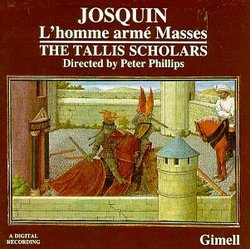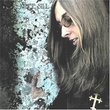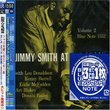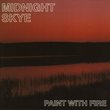| All Artists: Josquin Desprez Title: Josquin:L'homme Arme Members Wishing: 0 Total Copies: 0 Label: Polygram Classics Release Date: 9/17/1996 Genres: Special Interest, Classical Styles: Opera & Classical Vocal, Historical Periods, Renaissance (c.1450-1600) Number of Discs: 1 SwapaCD Credits: 1 UPC: 028945491929 |
Search - Josquin Desprez :: Josquin:L'homme Arme
 | Josquin Desprez Josquin:L'homme Arme Genres: Special Interest, Classical
The popular 15th-century tune L'homme armé became the basis of at least 31 Masses over two centuries. Josquin wrote two Mass settings using the melody as a cantus firmus (sung in long note-values in one voice, usually... more » |
Larger Image |
CD DetailsSynopsis
Amazon.com essential recording The popular 15th-century tune L'homme armé became the basis of at least 31 Masses over two centuries. Josquin wrote two Mass settings using the melody as a cantus firmus (sung in long note-values in one voice, usually the tenor). Missa L'homme armé super voces musicales begins the tune a tone higher in each succeeding movement; its texture is dense, with the four voices' ranges constantly overlapping. Missa L'homme armé sexti toni is more transparent, with the four voices' ranges spaced widely and sections for reduced voices numerous; its extraordinary final Agnus Dei à 6 plays two paired canons in the four upper parts against the cantus firmus in the lower voices--one singing it forwards, one backwards. The magical effect is often compared to the music of Philip Glass. --Matthew Westphal Similar CDs
|
CD ReviewsRenaissance at its best 06/17/2000 (5 out of 5 stars) "There are more than 30 mass-settings based on the L'homme armé melody in the renaissance period. I do know quite a lot of them and think that the two you'll find in this recording are one of the most impressive ones. Josquin, without doubt, is the "Michelangelo" of renaissance music, and for me, this disc would be one of ten for the "lonely island". The two masses represent two different faces of Josquin (traditional medieval and modern renaissance), but both emit the same incredible medidative aura which only can be experienced because of the congenial interpretation of the Tallis Scholars. Try, for example, the two Agnus Dei, the first one in Super Voces Musicales with its complicated structure of mensuration canons, or the other one of Sext Toni with its exceptional virtuosity and meditation quality which could be a composition of this century (a mixture between Glass and Pärt?). The Tallis Scholars have released exceptional interpretations of renaissance music, but this one, together with their other Josquin recording (Pange Lingua) and Cardoso's and Victoria's Requiem, is my favorite."
|

 Track Listings (11) - Disc #1
Track Listings (11) - Disc #1


